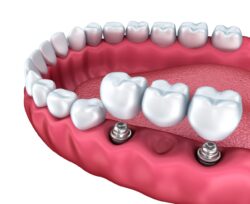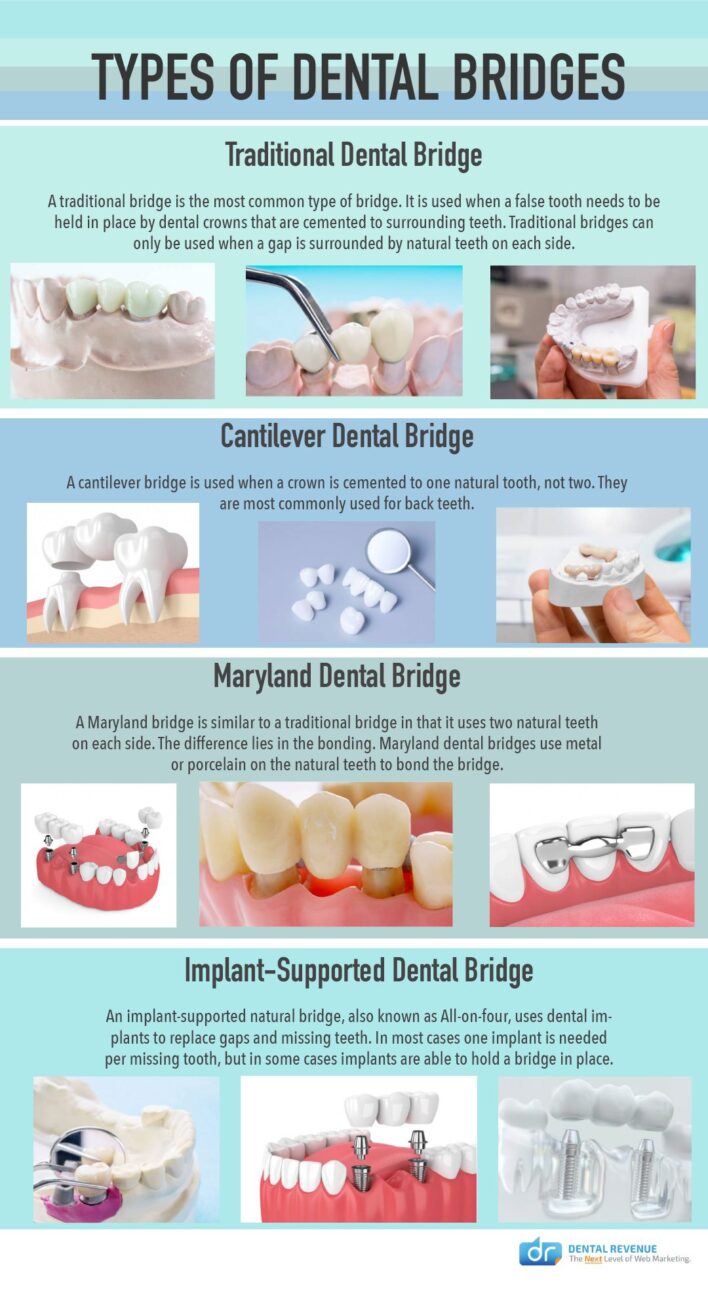Replacing missing teeth is important to prevent more complex dental problems from developing due to shifting teeth, changes in the gum tissue, and bone loss. Dr. Raj Upadya offers dental bridges as a solution for missing teeth. Dental bridges are one of the restorative dentistry treatments Dr. Upadya provides to the public in East Hanover, New Jersey.
A dental bridge is used to bridge a gap between teeth to replace one or more missing teeth. A dental bridge can either be removable or fixed and is made from a variety of tooth-like materials.
Dental Implants vs. Dental Bridge

When compared to a dental bridge, a dental implant provides superior long-term results. Dental implants are often the best solution for replacing teeth because they are the closest thing to a natural tooth. In fact, most people forget they have a dental implant.
While the initial concern of expense may be an issue, dental implants are an extremely conservative solution and present the fewest problems in the future. And while dental implant surgery may cause anxiety, the procedure is no more involved than the process of having a tooth pulled.
Dr. Upadya uses dental implants to replace a single tooth or several teeth, depending on the individual case.
Dental Bridges: What to Expect
 There are several types of dental bridges. Dr. Upadya will help you make the best decision to improve comfort and create optimal long-term results.
There are several types of dental bridges. Dr. Upadya will help you make the best decision to improve comfort and create optimal long-term results.
Removable Dental Bridge
Typically, a removable dental bridge is reserved for short-term solutions. A removable bridge may be used to maintain tooth position while a patient prepares to have a fixed dental bridge or dental implant. While the cost may be lower initially, removable dental bridges do not offer good long-term benefits and frequently require replacement or repair down the road.
Fixed Dental Bridge
In a fixed dental bridge, a prosthetic tooth is connected to two dental crowns which cover the teeth on either side of the gap. A drawback to this type of dental bridge is that it places stress on the natural teeth. Particularly if the teeth are in good health, this type of dental bridge could put unneeded stress on the teeth and can lead to premature wear or cavity formation.
Implant-Supported Dental Bridge
A better option is to have a fixed dental bridge secured by dental implants instead of dental crowns. Dr. Upadya will recommend an implant-supported dental bridge if a patient is missing several consecutive teeth. Implants offer better long-term benefits and do not affect neighboring teeth.
Additionally, dental implants promote continued bone growth, preventing both bone shrinkage and gum recession associated with traditional bridges and dentures.
If you choose to use dental implants, a treatment plan will be put in place after a thorough examination. The next step is the surgical placement of the implants which are tiny titanium posts that resemble a screw.
You will need at least three to six months of healing before the dental bridge can be permanently placed. We offer dental implant services under one roof to maintain our high quality of care for our patients.
Dental Bridges FAQs
How painful is a dental bridge?
Dental bridges are not painful. Dentists use anesthetic to numb patients’ mouths before the procedure so that they feel no pain throughout. Once it has been placed, you should not feel any pain.
Can a bridge be removed and put back on?
Bridges can be removed, repaired, and reapplied. The cement used to bond the bridge can be difficult to remove, but your dentist should be able to remove your bridge easily.
How long after extraction can I get a bridge?
Patients should wait 5-6 months to get a bridge after an extraction. This gives the gum time to heal from the extraction.
How long after a dental bridge can I eat?
After a dental bridge, patients must wait for the cement to dry and the bridge to settle. This can take up to one hour, so patients should wait at least this long before eating. Patients should avoid sticky or chewy foods for a few hours or until they’ve adjusted to the bridge.
How many years does a dental bridge last?
Dental bridges can last anywhere from five to 15 years. Patients with good diets and oral hygiene tend to have longer bridges.
How long do dental bridges last on front teeth?
Dental bridges on front teeth should last anywhere from five to seven years. Your bridge can last up to ten years with proper oral care and professional cleanings. Bridges on front teeth tend to have a shorter lifespan than other areas.
